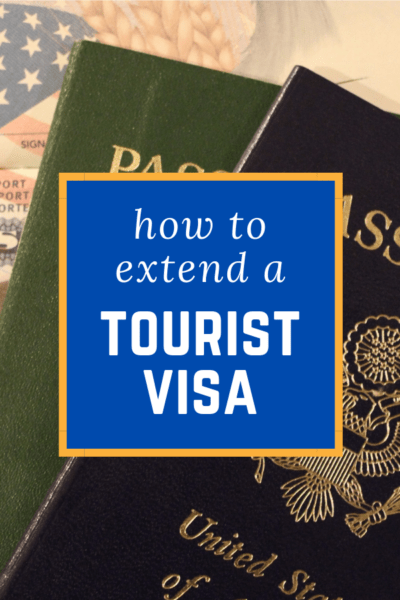Are you currently in another country and don't want to go home? Join the club! Lots of travelers fall in love with a foreign land and want to extend their stay.
For a traveler, few things are as depressing as when your tourist visa clock is about to strike midnight, and you're not ready to leave your newfound paradise. Well, you're not alone in this predicament, and there are some fantastic options available to you.
In this blog post, we'll explore the best ways to legally extend your stay abroad and make the most of your adventure. So, if you've ever fantasized about turning your vacation into a long-term stay, read on to discover your options!

How long can I stay in a country as a tourist?
Most countries will let tourists stay for between one and three months. Some will alllow you to extend your visa, while other won't. Much of that depends on which passport you carry.
Regardless of how long they'll let you stay, you must always keep track of how many days you've been in a country. The day you arrive counts as Day 1, even if your passport was stamped at 11:59 pm. Also, the day you leave is counted as well. We can tell you from experience that getting kicked out of a country is a horrific experience.
You also must remember to keep track of when your passport expires. As a general rule, your passport must be valid for at least six months beyond your period of stay. For instance, if you plan to leave a country on January 1, your passport's expiration date must be on July 1 or after.
- Immigrating to a new country usually requires a lot of paperwork, not to mention money.
- It's easier to get a work visa or go to school overseas (especially if you're under 30).
- Easiest of all is to enter as a tourist and stay as long as you can.
Living overseas when you only have a tourist visa
As Americans who have lived in multiple countries, Dan and I have been faced with expiring visas quite a few times. Over the years, we've learned that there are a variety of ways to live overseas on a tourist visa legally, and we've tried a lot of them.
As a matter of fact, many of the stories on this site are actually a direct result of having to leave the country for visa reasons.
So, let's assume you're reading this article because you want to stay or live in a country long-term. Here are some of the best ways to do it.
1. Apply for a visa extension
Yes, it can be that easy. Just ask. Sometimes getting a visa extension is as straightforward as: Walk into the immigration office, hand them your passport and paperwork, pay the fee. Done.
And sometimes, it's not. For instance, our social visa for Indonesia had a validity of only 60 days. Renewing it turned out to be quite a hassle, taking a minimum of 5 days and requiring three inconvenient visits to Bali's immigration office. With all the paperwork, fingerprints, photos, and payments – each with a different processor, different line – we spent many hours every month sitting in waiting rooms and standing on lines!
Looking back, this wasn't the smartest way to spend three days of every month. We should have hired someone to do that for us. A good visa service company knows exactly what is needed and can expedite everything, saving countless time and headaches. Honestly, the nominal fee is worth it.
2. Return to your native country
Simple idea: Stay as long as you can, then fly home. Lots of people do this and call their time overseas a “career break.”
We flew back to the United States occasionally, always to visit family. On those occasions, we booked our flights just before our visas ended.
It’s amazing how travel changes one's perceptions. That's one of the biggest reasons why we love it so much.
You know what they say about not appreciating things until you don't have them? Sometimes you also appreciate things more when you get them again, such as well-paved roads with clear road signs, or even more, being able to drink water straight from the tap.
3. Take a vacation, then get a new tourist visa on your return
Many digital nomads use this method: You leave the country before your visa expires, wait for a few days, then return. Immigration will put a fresh stamp in your passport, with a new expiration date.
This is an ideal way to make the best of the situation: Use it as a reason to see places you might not otherwise get a chance to visit.
If you have a goal to visit every country in the world, this is a dream come true.
They don't have to be long excursions, either. Usually, a weekend is all you need to not raise an immigraiton officer's eyebrows.
Some of our visa vacations were only for a few days, giving us a chance to get a taste of:
While others were for a longer time, such as:
For sure, it's by far my favorite way to renew a visa!
ⓘ TIP: The Secret Flying app will send you alerts whenever there are cheap flight deals and mistake fares from your airport. New York to Rome for only $227 roundtrip? Yes, please!

4. Cross the border, turn around and reenter the country
Instead of standing on those lines in Bali we could have flown to Singapore, gone shopping for a few hours, and flown back to Bali, where we would have received a brand-spankin'-new tourist visa. That’s a popular tactic, and pretty cheap at about $100.
They have a term for this, doing a visa run. It's a variation of visa extension option #3, above.
In Panama, a lot of expats cross into Costa Rica, turn around, and come right back. Though the official rule is to wait 72 hours, a border control agent will frequently issue you a new visa the same day if you give him a “tip.” Most expats cross the border on foot because there's a lot of paperwork required to bring a car into Costa Rica.
Driving in the other direction, to Colombia from Panama, is a no-go, because there's no road. A few people have hired guides to help them hike over the border, but crossing the Darien Gap on foot is extremely dangerous and can also be expensive.
My biggest regret from the time we lived in Panama is that we never did the visa run to Costa Rica next door. But I digress.
5. Relocate to a new country
This is a great option for retirees and those who work online. Rather than hassle with renewing a visa, just pack up and move to another country when your visa expires. Nowadays, there are many interesting and well-paying online abroad jobs you can apply for, so you won't have to struggle with making a living in a different country.
As much as we enjoyed our life in Bali, renewing our 30-day visas was a 3-day, time-consuming annoyance. Only four months after we'd moved there, we were more than ready to leave. We decided to move to Panama because:
- it was close to our aging parents, only a few hours away by plane,
- it's cheaper than living in the U.S.,
- Panama has a good infrastructure,
- the medical care is excellent,
- you can drink the tap water,
- visas are good for six months, and
- it came highly recommended as one of the best places to retire overseas.
We did it again a few years later, renting an apartment in Cuenca, Ecuador. But that's a whole different story.
Of course, that's only practical when you don't have a lot of possessions. We highly recommend downsizing before moving overseas. It's what we did, and it was incredibly freeing!
6. Go on a working holiday
As the name suggests, a Working Holiday Visa allows you to work in another country while traveling. Essentially, it’s a combination of working and holidaying abroad.
Many countries offer working holiday visas, which allow young people to work and live in another country for up to a year. Work restrictions may vary, but generally they allow temporary and part-time employment.
Working Holiday Visas are designed to promote a partnership between two or more countries through youth exchange. To be eligible, you must be from certain countries and between 18 and 30 or 35 years of age. The list of countries that offer working holiday visas is quite extensive, so it's best to research the specific requirements and limitations for each country.
7. Become a student
You don't have to be young to apply for a student visa. This visa allows you to enroll in an educational institution in your chosen country and stay for the duration of your program. This option is popular with those who wish to learn another language or study a particular subject.
A student visa can last anywhere from a few months to a few years, depending on how long the school program is.
Depending on the country and program, you may be required to take a minimum number of courses or maintain a specific grade point average in order to remain in the country. Some student visas also permit part-time work during your studies.
Student visas require confirmation of enrollment at an approved school in the host nation. You will also be required to provide evidence of sufficient funds to pay educational and living costs.
Fortunately, many student visas allow for part-time work, but there are limits on how many hours they can work each week.
8. Get a job
If you can find someone who is willing to hire you, you're in luck! A work visa gives you the ability to legally work and earn an income while living abroad.
Work visas are usually sponsored by an employer, so you'll need to have a secure job offer before applying for the visa. You'll then need to check with the embassy of the host country for specific information on how to apply and what documentation is required.
Typically, officials will review your qualifications and skills to see how they fit into the job market in the host country. Some countries have specific work visa categories for highly skilled workers. If you're bringing something unique that a local can't provide, you'll be well positioned to get the visa. The process can take several months though, so plan ahead!
Work visas typically have an expiration date and may require renewal after a certain period.
9. Start a business
Do you have a business idea that will require employees? Some countries offer business visas for individuals looking to invest in or establish a business within their borders. They often allow you to work and stay in the country while developing your business.
To qualify for a business visa, you will need to provide a detailed business plan, proof of funds, and evidence that your business will benefit the host country's economy. Some countries may also require an invitation from a local company or government agency.
As with other types of visas, there may be limitations on the length of stay and work permissions. It's essential to research the specific requirements and restrictions for a business visa in your desired country.
10. Invest in the country
Many countries offer a special visa to people who are able to invest a substantial amount of money in their economy. These “Golden Visas,” as they are frequently called, usually come with benefits like tax incentives, permanent residency, and sometimes even citizenship.
The investment can take various forms, depending on the country. You may be required to purchase a certain amount of property, invest a business, or simply donate a large amount of money to the country's economy.
To see the list of countries that offer a Golden Visa, check this website.
11. Become a retiree
Several countries have visa programs designed for retirees or pensioners. We were able to stay in Malaysia for 4 years thanks to the MM2H retirement visa. That program allowed us to work part-time, and our visa was good for 10 years from the date of approval.
On the other hand, we had friends in Ecuador who had applied for the retirement visa. The Jubilado Visa conditions are:
- You must be at least 65 years old.
- You must have a monthly income of at least $1275.
- You must have a clean criminal record.
- You must not be considered a threat to the Ecuadorian State.
- You must be able to support yourself financially.
The duration of retirement visas varies by country and can range from several years to indefinitely. Some countries won't let retirees to engage in regular employment in the host country, while others will allow a limited work schedule. Additionally, some countries may require health insurance coverage as part of the retirement visa application process.
In our opinion, retirement visas are one of the best ways to spend your golden years in a different country and enjoy a lower cost of living.
The key to a worry-free life abroad
If you're planning to become an expat and live your dream life abroad, don't forget that you're going to need insurance. It's like your safety net for all those unexpected twists and turns that life can throw at you, especially because you're living in an unfamiliar environment.
Both Ekta and Safety Wing offer affordable travel insurance, and both offer policies that last for up to one year. With plans tailored to your needs, you won't have to worry about things like medical emergencies, trip cancellations, and stolen electronics.
So, before you get too comfortable in your new home, make sure you've got your travel insurance sorted. It'll be your ticket to peace of mind as you embrace the expat lifestyle.
FAQs about living abroad on a tourist visa
Is visa running illegal?
Visa running is not illegal. However, foreigners often use it as a way to live and work in the country illegally, so you may be turned away at the border. Before you do a visa run, check the country's visa policy. Some countries allow immediate reentry, while others require a minimum amount of time before returning
What's the difference between a visa and a passport?
A passport is an official document from your home country that proves your identity and nationality. A visa is issued by a foreign country and allows you to enter and stay for a specific time and reason. Most visas are stamped on passports or attached to it. Both are required for international travel.
How do I get a visa to visit the U.S.?
The Visa Waiver Program (VWP) enables citizens of participating countries to travel to the U.S. for tourism or business for 90 days or less without obtaining a U.S. visa. Read about the VWP and apply for ESTA on the official website. If you are not eligible for ESTA, you can find other options on the U.S. State Department website.
Can a U.S. citizen travel to all countries?
As of July 2023, United States passport holders may travel to 185 countries and territories without a travel visa, or with a visa on arrival. For visa requirements by country, use the search box on the U.S. State Department's country information page.
What countries are visa free for UK citizens?
As of September 22, 2023, British passport holders have visa-free and visas on arrival access to 189 countries.
In conclusion
So there you have it: Our list of the best ways to legally live overseas when your tourist visa expires.
Moving overseas can be an exciting adventure, but it requires careful planning and preparation, particularly when it comes to the visa situation. I hope we've helped you understand the various options, so you can live overseas on your own terms.




Your email address will not be published. Required fields are marked *
Message: *
Hi!
I’m interested about using either method 3 or 4 to renew the 90 day tourist visa for Costa Rica. Do you know if this method would work for obtaining a new tourist visa for Costa Rica? I was thinking about going to Colombia or Cuba then re-entering. Will this be possible? Thanks!
Hi, Jake. Thanks for stopping by and asking your question. Please understand, I have no first-hand familiarity with Costa Rica and its visas.
That said, I googled “Costa Rica visa run” and came up with this result. As I understand it, the two most popular Central American destinations for a Costa Rica visa run are Bocas del Toro, Panama and Granada, Nicaragua. I’m not familiar with Granada, but Bocas is a quick boat trip away and a nice weekend getaway for a visa run. (Read about it here.) By the way, as a workaround to prove that you will be leaving the country within 90 days, a lot of expats purchase a fully refundable ticket beforehand.